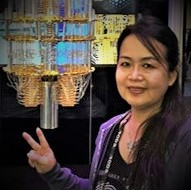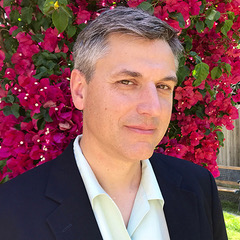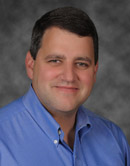Table of Contents
PLENARY
SPEAKERS
Office Director
Office
of Advanced Cyberinfrastructure
Directorate
for Computer & Information
Science & Engineering
National
Science Foundation
Topic:
"Overview of NSF's Office of
Advanced Cyberinfrastructure
and Future Directions"
Slides:
PDF
Talk Abstract
The
Office
of Advanced Cyberinfrastructure
supports
the development and deployment of
advanced computing,
data
and
networking research infrastructure,
in addition to
tools, services, software and training
for the academic community.
In this talk,
I will provide
an overview of the OAC portfolio
and
a perspective on the challenges
as well as opportunities
we face as a community,
and offer some future directions.
The talk will also describe
the latest efforts to launch
a
National
AI Research Resource
(NAIRR)
pilot.
Biography
Katie Anytpas
is the Director of the
National
Science Foundation's
Office
of Advanced Cyberinfrastructure,
which is responsible for coordinating
the development and deployment of
advanced computing,
data
and
networking
research infrastructure,
tools,
services,
and
training
for the research and education community.
Prior to joining NSF,
Katie was at the
National
Energy Research Scientific Computing
(NERSC)
Center
at
Lawrence
Berkeley National Laboratory,
serving for 17 years in
a variety of roles,
including as NERSC Division Deputy,
Project Director for
NERSC's large-scale High Performance Computing
system acquisitions,
Director of Hardware and Integration
of the
Exascale
Computing Project,
Data Department
Head,
and
User Services Group
Lead.
Before coming to NERSC in 2006,
Katie worked at the
Flash Center
at the
University
of Chicago
on the
FLASH code,
a highly scalable,
parallel,
adaptive mesh refinement
astrophysics application.
She has an M.S. in
Computer Science
from the
University of Chicago
and a bachelor's degree in
Physics
from
Wellesley
College.
Director
OU
Supercomputing Center for Education
& Research (OSCER)
Executive Director of Research Computing
Information
Technology
Associate Professor
College
of Engineering
Adjunct Associate Professor
School
of Computer Science
University
of Oklahoma
Topic:
"OSCER State of the Center Address"
Slides:
PowerPoint
PDF
Talk Abstract
The
OU
Supercomputing Center for
Education & Research
(OSCER)
celebrated its 22st anniversary
on August 31 2023.
In this report,
we examine
what OSCER is,
what OSCER does,
what OSCER has accomplished
in its 16 years,
and where OSCER is going.
Biography
Dr.
Henry Neeman
is the
Director of the
OU
Supercomputing Center for Education &
Research,
Executive Director of Research Computing
for OU
Information
Technology
(IT),
Associate Professor in the
College
of Engineering
and
Adjunct Associate Professor in the
School
of Computer Science
at the
University of
Oklahoma.
He received his BS in computer science
and his BA in statistics
with a minor in mathematics
from the
State
University of New York at Buffalo
in 1987,
his MS in CS from the
University of
Illinois at Urbana-Champaign
in 1990
and his PhD in CS from UIUC in 1996.
Prior to coming to OU,
Dr. Neeman was a postdoctoral research
associate at the
National
Center for Supercomputing Applications
at UIUC,
and before that served as
a graduate research assistant
both at NCSA
and at the
Center for
Supercomputing Research &
Development.
In addition to his own teaching and research,
Dr. Neeman has collaborated with
dozens of research groups,
applying High Performance Computing techniques
in fields such as
numerical weather prediction,
bioinformatics and genomics,
data mining,
high energy physics,
astronomy,
nanotechnology,
petroleum reservoir management,
river basin modeling
and engineering optimization.
He serves as an ad hoc advisor
to student researchers
in many of these fields.
Dr. Neeman's research interests include
high performance computing,
scientific computing,
parallel and distributed computing
and
computer science education.
Liwen
Shih

Professor
Department
of Engineering
University
of Houston - Clear Lake
Topic:
"QA^HPC -- on the Quest of
Quantum/AI Optimized HPC"
Slides:
available after the Symposium
Abstract
In this talk,
Dr. Liwen Shih will take you through
the amazing Q/AI/HPC journey on
Quantum Optimization,
Heterogeneous Computing,
Complex Bioinformatics,
Adaptive Image Processing,
Computer–Aided Diagnosis,
Material Design,
Tele/Mobile-Operation,
Space Radiation/Debris,
Functional Health,
Seismic Earthquake Wave Propagation,
Wildfire Detection,
Sustainable Green Ecosystem,
Low-Impact Permaculture,
and
tackling other complex
Biomed,
Aerospace,
Seismic,
Energy,
Environment,
Games/Puzzles/Creativity,
Social and Engineering challenges.
Biography
Computer Engineering Professor and former Chair
Liwen Shih at
University
of Houston - Clear Lake
specializes in
smart optimized mapping between
hardware and software.
Professor Shih regularly teaches
Quantum Computing,
Bio-Inspired AI,
Artificial Neural Network/Machine Learning,
High Performance Computing Architecture,
Heterogeneous Computing,
and
research projects.
Dr. Shih is
DoE Visiting Research Faculty at
Oak
Ridge National Laboratory
2023
and
Lawrence
Berkeley National Laboratory
and Research Affiliate since 2021,
an XSEDE/TeraGrid
Campus
Champion
since 2009
and
inaugural XSEDE CC Fellow for
CyberShake
2013,
Fulbright Computer Specialist of
US
Department of State,
and
Lekkos Endowment
Research Faculty Fellow.
Dr. Shih has a Ph.D. in
Computer
Engineering & Science
from
Case
Western Reserve University
directly after her BS degree
in
Computer Engineering
from
National
Chiao Tung University
in Taiwan.
Dr. Shih has contributed globally as
invited keynote/featured/panel speaker in
Japan,
India,
Turkey,
China,
Canada,
Pacific
Northwest National Laboratory,
U.S.
Department of Energy,
University
of Texas Medical Branch,
Texas
Medical Center,
etc.
Professor Shih is dedicated to
the emergence of
next generation of super-computing
with focus in
Adaptive Solution Optimization
via
Quantum/Vector Annealing,
HPC,
Topology-Aware,
Latency-Adaptive,
Load-Imbalanced,
Self-Organized Scheduling,
& Bio-inspired AI.
Dr. Shih's current scope expands on
Quantum Optimization,
Composable
FPGA/GPU/IPU/TPU/QPU/VE/DPU/DSP/ASIC-accelerated
Heterogeneous Computing,
Complex Bioinformatics,
Adaptive Image Processing,
Computer–Aided Diagnosis,
Material Design,
Tele/Mobile-Operation,
Space Radiation/Debris,
Proactive Functional Health
(fitness, nutrition, aging and immunity),
Seismic Earthquake Wave Propagation,
Sustainable Green Ecosystem,
Low-Impact Permaculture,
and tackling other complex
Biomed, Aerospace, Seismic, Energy,
Environment, Social and Engineering challenges.
Addison
Snell

Chief Executive Officer
Intersect360
Research
Topic:
"The New Frontier in Supercomputing"
Slides:
PDF
Abstract
High Performance Computing (HPC)
has been at the forefront of
scientific discovery and engineering innovation
for decades,
with each new insight
unlocking fresh avenues of research,
pointing the way to
the breakthroughs of tomorrow.
HPC is at the heart of
grand challenge problems,
such as mitigating climate change,
battling pandemics,
and
finding new energy sources.
It's also embedded in daily life,
with safer minivans,
sturdier home construction,
and shinier hair.
So what's new in an industry that's always new?
Well, we have AI now.
Here's where things can really get interesting.
Biography
Addison
Snell
is the Chief Executive Officer of
Intersect360
Research
and a veteran of the
High Performance Computing industry.
He launched the company in 2007 as
Tabor Research,
a division of
Tabor
Communications,
and served as that company's
Vice President/General Manager
until he and his partner,
Christopher
Willard, Ph.D.,
acquired Tabor Research in 2009.
During his tenure,
Addison has established Intersect360 Research
as a premier source of market information,
analysis,
and consulting.
He was named one of
2010's
"People to Watch"
by
HPCwire.
Addison was previously
an HPC industry analyst for
IDC,
where he was well-known
among industry stakeholders.
Prior to IDC,
he gained recognition
as a marketing leader and spokesperson for
SGI's
supercomputing products and strategy.
Addison holds a master's degree from the
Kellogg
School of Management
at
Northwestern
University
and a bachelor's degree from the
University
of Pennsylvania.
Dan
Stanzione

Executive Director
Texas
Advanced Computing Center
The University
of Texas at Austin
Topic:
"Academic HPC in the Age of AI"
Slides:
available after the Symposium
Talk Abstract
This past year had significant milestones in AI,
and it's clear that at this point,
AI and HPC are inextricably intertwined.
This talk will discuss why that is,
and the implications for traditional HPC in
an AI driven market,
and what it means to run AI workloads on
current/future HPC systems.
The talk will also touch on
the nascent plans for
a National AI Research Resource
at NSF and beyond.
Biography
Dan Stanzione is the Executive Director of the
Texas
Advanced Computing Center
(TACC)
at
The
University of Texas at Austin
and the Principal Investigator for
Wrangler.
He is also the PI for TACC's 10 PetaFlop
Stampede
supercomputer,
and has previously been involved in
the deployment and operation of the
Ranger
and
Lonestar
supercomputers at TACC.
He served as the Co-Director of
The
iPlant Collaborative,
an ambitious endeavor to build
cyberinfrastructure to address
the grand challenges of plant science.
Prior to joining TACC,
Dr. Stanzione was the founding director of the
Ira A. Fulton
High Performance Computing Institute
(HPCI)
at
Arizona
State University (ASU).
Before ASU,
he served as an AAAS Science Policy Fellow
in the
National
Science Foundation
and as a research professor at
Clemson
University,
his alma mater.

